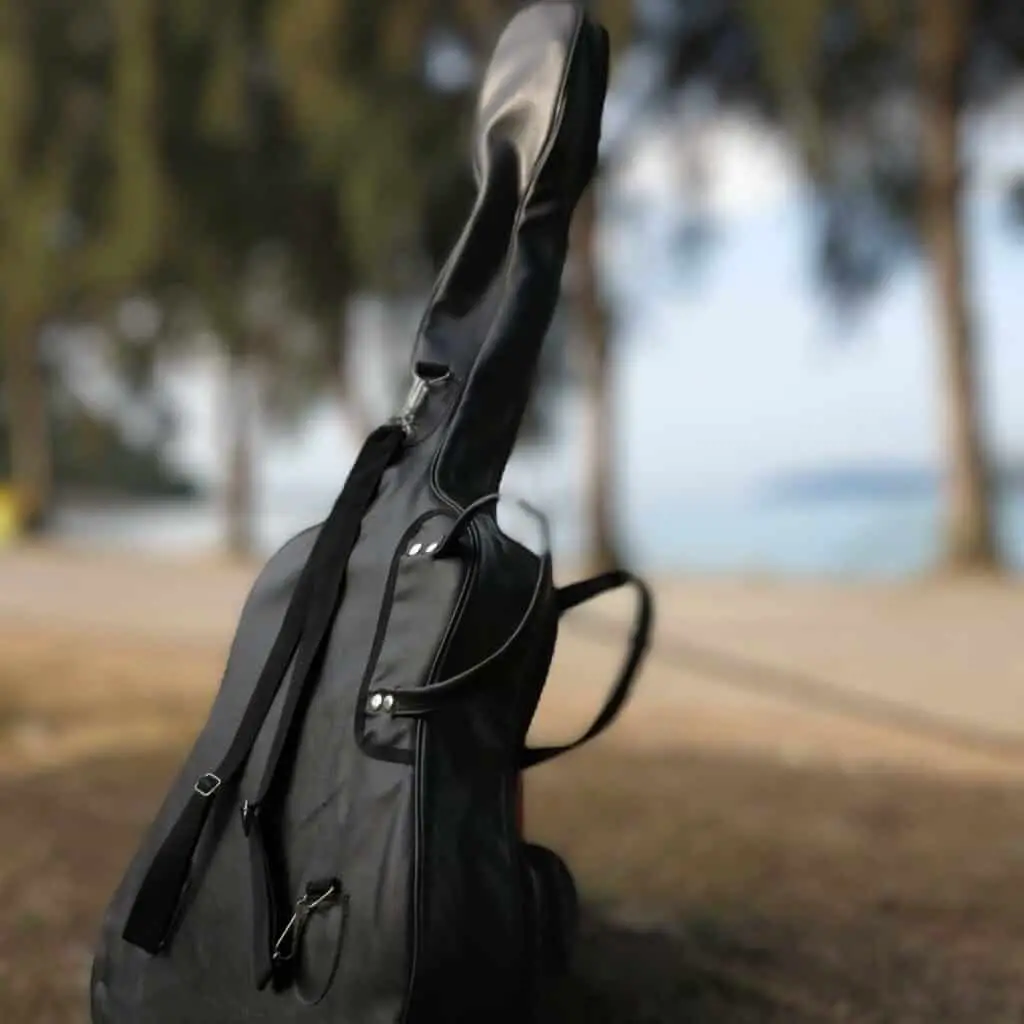A gigbag is a type of bag designed to protect musical instruments, particularly guitars. They are typically made from durable materials such as nylon or polyester, and often have padding to help safeguard the instrument. Gigbags usually have handles and/or shoulder straps for easy transport, and may also have compartments for storing accessories such as strings, picks, and sheet music. Whether you’re a gigging musician or simply someone who likes to keep their prized instrument safe at home, a gigbag can be a valuable investment.
It’s called a gig bag because of the way it protects your guitar when you take it out to a “gig” or live performance.

Understanding Gigbags: A Comprehensive Guide
A gigbag is a type of bag designed for the storage, transport, and protection of musical instruments, commonly guitars and basses. It is an alternative to the traditional hard case and is known for being lightweight and easy to carry.
The Different Types of Gigbags
There are several different types of gigbags available, each with its own unique features:
- Padded gigbags: These gigbags have extra padding to protect the instrument during transport.
- Lightweight gigbags: These gigbags are designed to be as lightweight as possible, making them easy to carry.
- Multi-pocket gigbags: These gigbags have several external pockets for carrying extra gear.
- Hardshell gigbags: These gigbags have a hard exterior shell for extra protection.
- Backpack gigbags: These gigbags have two shoulder straps, making them easier to carry on your back.
Choosing the Right Gigbag
When choosing a gigbag, there are several factors to consider:
- Size: Make sure you buy a gigbag that is the right size for your instrument. Measure your guitar or bass and compare it to the gigbag’s measurements before making a purchase.
- Padding: Consider how much padding you need to protect your instrument during transport.
- Extra pockets: Decide if you need external pockets for carrying extra gear.
- Material: Look for a gigbag made of durable materials, such as nylon.
- Brand: Choose a reliable brand with decades of experience in manufacturing musical instrument accessories, such as Gator or Amazon Basics.
In conclusion, a gigbag is a lightweight, cost-effective, and easy-to-use alternative to a traditional hard case. It is designed to protect your instrument during transport and comes in a variety of models and sizes to fit your needs. With the right gigbag, you can transport your instrument safely and easily, whether you’re heading to a gig or just carrying it around town.
Gigbag Types
Guitar gigbags are the most commonly used gigbags in the musical world. They are designed to store and transport guitars safely. These gigbags are available in different sizes and shapes to fit different types of guitars. Some of the popular types of guitar gigbags include:
- Acoustic guitar gigbags
- Electric guitar gigbags
- Bass guitar gigbags
Drum Gigbags
Drum gigbags are designed to store and transport drums safely. These gigbags are available in different sizes and shapes to fit different types of drums. Some of the popular types of drum gigbags include:
- Bass drum gigbags
- Snare drum gigbags
- Tom drum gigbags
Brass and Woodwind Gigbags
Brass and woodwind gigbags are designed to store and transport brass and woodwind instruments safely. These gigbags are available in different sizes and shapes to fit different types of instruments. Some of the popular types of brass and woodwind gigbags include:
- Trumpet gigbags
- Saxophone gigbags
- Clarinet gigbags
Gigbag Materials
When it comes to gigbags, the materials used can make a big difference in terms of protection, weight, and durability. Here are some of the most common materials used in gigbags:
Nylon
Nylon is a popular choice for gigbags because it is lightweight and affordable. It also offers some protection against water and other liquids. However, nylon gigbags may not provide the highest level of protection against impacts or other types of damage.
Polyester
Polyester is another lightweight and affordable option for gigbags. It is more durable than nylon and offers better protection against impacts. However, polyester gigbags may not be as water-resistant as nylon.
Canvas
Canvas is a heavier and more durable material than nylon or polyester. It offers good protection against impacts and is often used for gigbags for heavier instruments like guitars with Bigsby or locking tremolo systems. Canvas gigbags may also offer some water resistance.
Leather
Leather gigbags are the most expensive option, but they offer the highest level of protection and durability. They are also water-resistant and can be a stylish accessory for your instrument. However, leather gigbags can be heavy and may not be the best choice for customers who want a lightweight option.
Reasons to Have a Gigbag for Your Instrument
If you’re a musician who’s always on the go, having a gigbag is essential. It provides protection for your instrument while also being convenient to carry around. Here are some reasons why you need a gigbag:
- A gigbag offers basic protection for your instrument against scratches, dings, and other minor damages that can happen during transport.
- Gigbags are generally lighter and more convenient to carry around than hard cases, especially if you’re traveling by foot or public transportation.
- A gigbag offers additional storage for accessories such as spare strings, batteries, effect pedals, and more.
- Having a gigbag with shoulder straps allows you to easily carry your instrument while leaving your hands free to carry other items.
Cost-Effective
Buying a good quality hard case can cost a lot of money, especially if you need to buy one for each instrument you own. A gigbag, on the other hand, offers a wide range of options at a much lower cost. You can get a gigbag for as little as $20, which is a smart choice if you’re on a tight budget.
Essential for Gigging Musicians
If you’re a gigging musician, having a gigbag is certainly a must. Here’s why:
- Gigbags offer protection for your instrument while you’re on the road or in transit to a gig.
- Gigbags are convenient to carry around and offer additional storage for accessories you might need during a gig.
- Having a gigbag with shoulder straps allows you to easily transport your instrument from the car to the gig venue without having to make multiple trips.
Gigbag vs Case: Which One Should You Choose?
Gigbags are a popular choice for guitarists who are always on the go. They are lightweight and easy to carry, making them the perfect option for musicians who need to travel with their instruments. Here are some of the features that make gigbags a great choice:
- Lightweight: Gigbags are usually made from lightweight materials like nylon or vinyl, which makes them easy to carry around.
- Convenient: Gigbags usually come with shoulder straps, making them easy to carry around on trips or to gigs.
- Affordable: Gigbags are usually less expensive than hardshell cases, making them a great option for musicians on a budget.
- Extra pockets: Many gigbags come with extra pockets for carrying accessories like capos, strings, and even small amps.
Cases: Maximum Protection and Reliability
Cases are the preferred option for musicians who want maximum protection for their instruments. They are usually more expensive than gigbags, but they offer a higher level of protection. Here are some of the features that make cases a great choice:
- Maximum protection: Cases are usually made from hard materials like wood or plastic, which offer a high level of protection for your instrument.
- Reliability: Cases are more reliable than gigbags, as they are less likely to break or wear out over time.
- Sturdy and rigid: Cases have thick walls that provide extra protection against bumps and knocks.
- Peace of mind: Cases offer peace of mind when travelling with your instrument, as you know it is well-protected.
- Polar opposite of gigbags: Cases are the polar opposite of gigbags in terms of weight, bulkiness, and cost.
Which One Should You Choose?
Choosing between a gigbag and a case depends on your specific needs and preferences. Here are some things to consider when making your decision:
- How often do you travel with your guitar? If you’re always on the go, a gigbag might be the better option.
- How much protection do you need? If you’re looking for maximum protection, a case is the way to go.
- What’s your budget? Gigbags are usually less expensive than cases, so if you’re on a tight budget, a gigbag might be the better option.
- What’s your preferred style? Gigbags have a more casual, laid-back style, while cases have a more professional, business-like look.
- How heavy is your guitar? If your guitar is on the heavier side, a case might be a better option for carrying it around.
- How long are your trips? If you’re going on longer trips, a case might be a better option for protecting your instrument.
- Do you need extra storage? If you need extra storage for accessories like capos and strings, a gigbag might be the better option.
Ultimately, the choice between a gigbag and a case is dependent on your specific needs and preferences. Both options offer their own set of benefits, so it’s important to weigh the pros and cons before making a decision.
Conclusion
So there you have it, everything you need to know about gigbags. Gigbags are lightweight and easy to carry, and provide basic protection for your instrument. Plus, they’re cheaper than hard cases and great for transporting your guitar to and from gigs. So don’t forget to pick one up the next time you’re at the music store!
I'm Joost Nusselder, the founder of Neaera and a content marketer, dad, and love trying out new equipment with guitar at the heart of my passion, and together with my team, I've been creating in-depth blog articles since 2020 to help loyal readers with recording and guitar tips.

